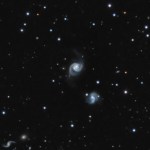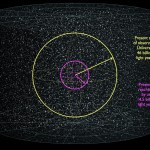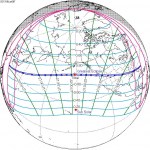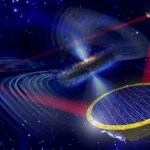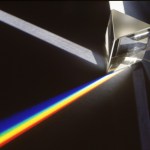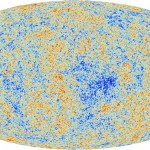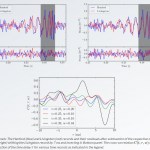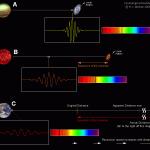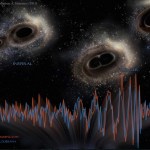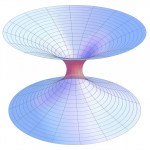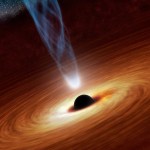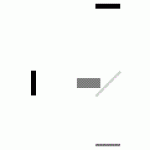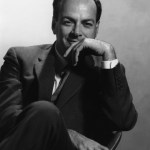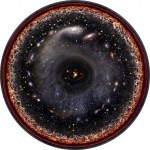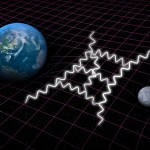Relativity
"It’s becoming clear that in a sense the cosmos provides the only laboratory where sufficiently extreme conditions are ever achieved to test new ideas on particle physics. The energies in the Big Bang were far higher than we can ever achieve on Earth. So by looking at evidence for the Big Bang, and by studying things like neutron stars, we are in effect learning something about fundamental physics." -Martin Rees
When the Advanced LIGO detectors turned on in 2015, it shook up the world when they detected their first event: the merger of two quite massive black holes. Since that time, they’ve…
“The more clearly we can focus our attention on the wonders and realities of the universe about us, the less taste we shall have for destruction.” -Rachel Carson
The idea that the spatial fabric of the Universe itself is expanding, and that’s what’s behind the observed relationship between redshift and distance has long been controversial, and also long-misunderstood. After all, if more distant objects appear to recede more quickly, couldn’t there be a different explanation, like an explosion that flung many things outward? As it turns out, this isn’t a mere difference in interpretation,…
“Astronomers are greatly disappointed when, having traveled halfway around the world to see an eclipse, clouds prevent a sight of it; and yet a sense of relief accompanies the disappointment.” –Simon Newcomb
On August 21st, a total solar eclipse will travel coast-to-coast across the United States, bringing darkness during the day to portions of 14 separate states. The last time such an event occurred was 99 years ago, back in 1918. Back then, Einstein’s General Relativity still had not been proven, and this eclipse not only provided that opportunity, but held an opportunity for America to…
"The years of searching in the dark for a truth that one feels but cannot express, the intense desire and the alternations of confidence and misgiving until one breaks through to clarity and understanding, are only known to him who has himself experienced them." -Albert Einstein
In 2015, for the very first time, gravitational waves were directly detected from the merger of two massive black holes. These ripples in space traveled over a billion light years before they were finally detected. When they were, it validated Einstein’s theory of General Relativity in an entirely new fashion, and…
"There was a young lady named Bright,
Whose speed was far faster than light;
She set out one day
In a relative way,
And returned on the previous night." -A.H. Reginald Butler
Throughout the entire Universe, there’s a fundamental law that governs the motions of all particles: Einstein’s relativity. It states that all particles with mass can never attain the speed of light, no matter how much energy you put into it. Additionally, all massless particles only move at the speed of light, no matter what you do to either them or to the device/person observing them. No matter what reference…
"The design of the universe...is very magnificent and shouldn’t be taken for granted." -Charles W. Misner
One of the more puzzling aspects of our Universe is that, no matter which direction we look in, no matter how far away we check, its properties appear to be practically identical. This is surprising, since no signal can reach from one disconnected region to another, and yet the Universe behaves as if everything began from the same initial state. We refer to this as the horizon problem.
If these three different regions of space never had time to thermalize, share information or transmit…
“Gamow was fantastic in his ideas. He was right, he was wrong. More often wrong than right. Always interesting; … and when his idea was not wrong it was not only right, it was new.” -Edward Teller
100 years ago, our conception of the Universe was so small it's almost laughable. We still were mired in Newtonian thought, conceiving only of the stars within our own Milky Way, with a Universe that was perceived as static and unchanging, and where the stars which made it up perhaps even lived forever. Yet today, we have a Universe that's expanding, cooling, full of dark matter and dark energy, and…
"We hope that interested people will repeat our calculations and will make up their own minds regarding the significance of the results. It is obvious that "belief" is never an alternative to "understanding" in physics." -J. Creswell et al.
Three times now, the LIGO collaboration has produced very strong evidence that black hole pairs, from across the Universe, inspiraled and merged, producing gravitational waves. The twin LIGO detectors in Hanford, WA and Livingston, LA each detected these signals, and the signals were correlated between both detectors. For the first time ever (and the…
"In expanding the field of knowledge we but increase the horizon of ignorance." -Henry Miller
You know it as the most fundamental law of relativity: that nothing can travel faster than the speed of light. And yet, the observable Universe itself, which has been around for 13.8 billion years since the Big Bang, is now 46.1 billion light years in radius. If everything were contracted down to a tiny volume of space, it seems that such a size would be impossible to achieve. Unless, somehow, space itself were expanding faster than the speed of light.
The Hercules galaxy cluster showcases a great…
"What's really exciting is what comes next. I think we're opening a window on the universe -- a window of gravitational wave astronomy." -Dave Reitze, executive director of LIGO
It revolutionized our view of the Universe when the LIGO annoucements – and we’re up to three, now – came out. They indicated the direct detection of gravitational waves from merging black holes, teaching us about a new population of stellar remnants, confirming the existence of gravitational waves, and showcasing yet another victory for Einstein’s General Relativity. But it all rests on one critical assumption: that…
"We have never observed infinity in nature. Whenever you have infinities in a theory, that's where the theory fails as a description of nature. And if space was born in the Big Bang, yet is infinite now, we are forced to believe that it's instantaneously, infinitely big. It seems absurd." -Janna Levin
You’ve likely heard that there’s no sound in space; that sound needs a medium to travel through, and in the vacuum of space, there is none. That’s true... up to a point. If you were only a few light years away from a star, stellar remnant, black hole, or even a supernova, you’d have no way to…
"One of the great things about music is that it has the capability of time travel - you smell a certain smell in the room and it takes you back to your childhood. I feel like music is able to do that, and it happens to me all the time." -M. Ward
Have you ever wondered about time travel? Perhaps you have your destination in the far future, and want to see how it all turns out? Maybe you want to return to the past, and alter the future or present by your actions there? Or maybe you want to freeze time altogether? If you want to know whether it's possible, the physics of relativity holds the…
“It is conceptually interesting, if not astrophysically very important, to calculate the precise apparent shape of the black hole... Unfortunately, there seems to be no hope of observing this effect.” -Jim Bardeen
Black holes were one of the first consequences of general relativity that were predicted to exist, and the more we’ve studied the Universe, the more interesting they’ve become. We’ve calculated their physical sizes, their effects on the curvature of spacetime, their apparent angular sizes, and the properties of matter that gets caught in an accretion disk around them. But we’re…
"It appears, from all that precedes, reasonably certain that if there be any relative motion between the earth and the luminiferous ether, it must be small; quite small enough entirely to refute Fresnel's explanation of aberration." -Albert A. Michelson
In the 1880s, it was clear that something was wrong with Newton’s formulation of the Universe. Gravitation didn’t explain everything, objects behaved bizarrely close to the speed of light, and light was exhibiting wave-like properties. But surely, even if it were a wave, it required a medium to travel through, just like all other waves? That…
"If you haven't found something strange during the day, it hasn't been much of a day." -John Archibald Wheeler
Today, we take the existence of gravitational waves for granted. They were predicted by Einstein almost immediately following the first publication of general relativity, they were indirectly detected decades ago and they’ve been directly detected multiple times by the different LIGO observatories. Yet Einstein and his former student argued, back from the 1930s through the 1950s, that the waves were mere mathematical artifacts, and didn’t physically exist.
Richard Feynman, at…
"I really didn't have to work, shall we say, with Star Trek. It was a natural. When I opened my mouth, there was Scotty. It's like I tell people what you see in Scotty is 99% James Doohan and 1% accent." -James Doohan
So, your friend on the USS Enterprise beamed you aboard, took you on a relativistic journey at impulse speeds around the Solar System, and brought you back to your starting point. You find that less time has passed for you than your family who remained on Earth, yet you’ve traveled a much greater distance. How does this all work?
Moving close to the speed of light results in…
“I want to stand as close to the edge as I can without going over. Out on the edge you see all the kinds of things you can’t see from the center.” -Kurt Vonnegut
We all know how explosions work: a tremendous release of energy causes a rapid outward expansion, and the most energetic particles get flung the farthest and at the greatest speeds. Things fly apart, spread out, and wind up a tremendous distance away. And within our Universe, nothing has ever released more energy than the event that started it all: the Big Bang.
An explosion in space would have the outermost material move away the…
"'Space-time' - that hideous hybrid whose very hyphen looks phoney." -Vladimir Nabokov
Sure, you know what space and time are. If you heard of Einstein and relativity, you might know that they’re not absolute quantities, but that how you experience distances and the ticking of clocks is dependent on your motion through the Universe. But did you also know that the addition of masses and gravitation to the theory didn’t just result in general relativity, but changed the way we viewed the Universe completely?
Quantum field theory calculations are normally done in flat space, but general…
"The only man who never makes a mistake is the man who never does anything." -Theodore Roosevelt
Scientists make mistakes. We fail. We have our intuition lead us astray; we synthesize information in ways that lead to catastrophically wrong predictions. Whether we make sloppy, calculational errors, have oversights in what we consider, or whether we simply engage in motivated reasoning to attempt to reach our desired conclusions, even the greatest of us make mistakes. Even Einstein.
Niels Bohr and Albert Einstein together in 1925, engaging in their famous conversations/debates about quantum…
“The very closest stars would require many years to visit, even traveling at the speed of light, which is impossible according to Einstein’s theory of relativity. Today’s fastest spaceships would require 200,000 years to travel to Alpha Centauri, our closest bright star. The energy required to send a hundred colonists to another star, as Frank Drake has pointed out, would be enough to meet the energy needs of the entire United States over a human lifetime. And these estimates are regarding nearby stars. When we consider the distances across the entire galaxy, and between galaxies,…
